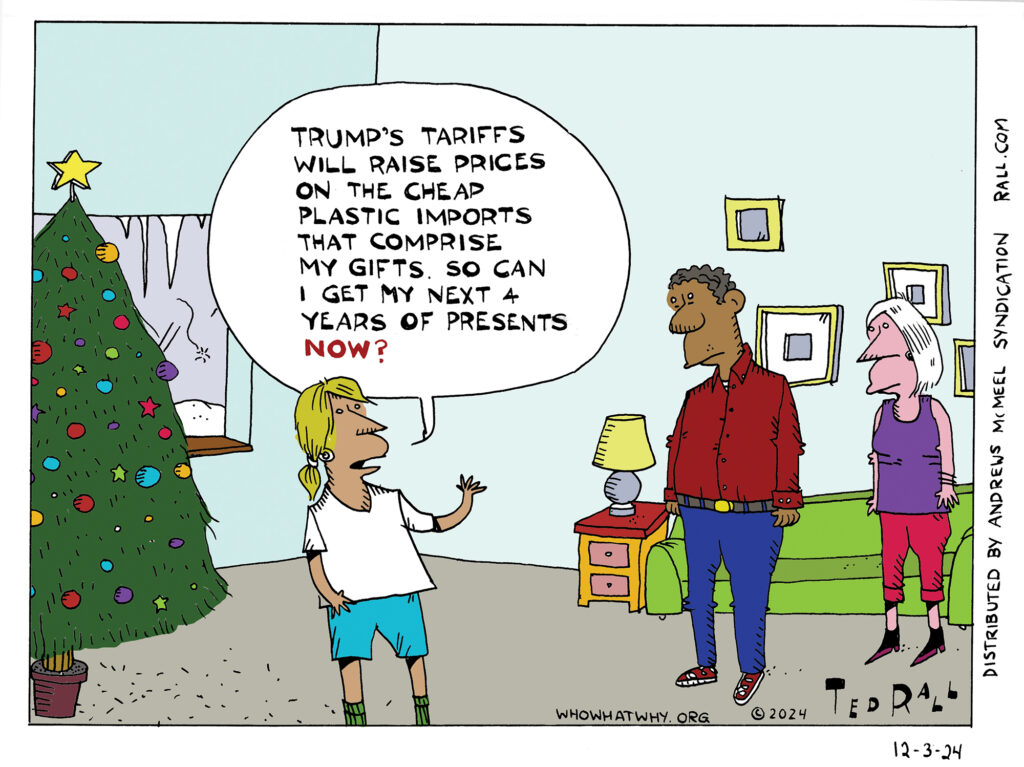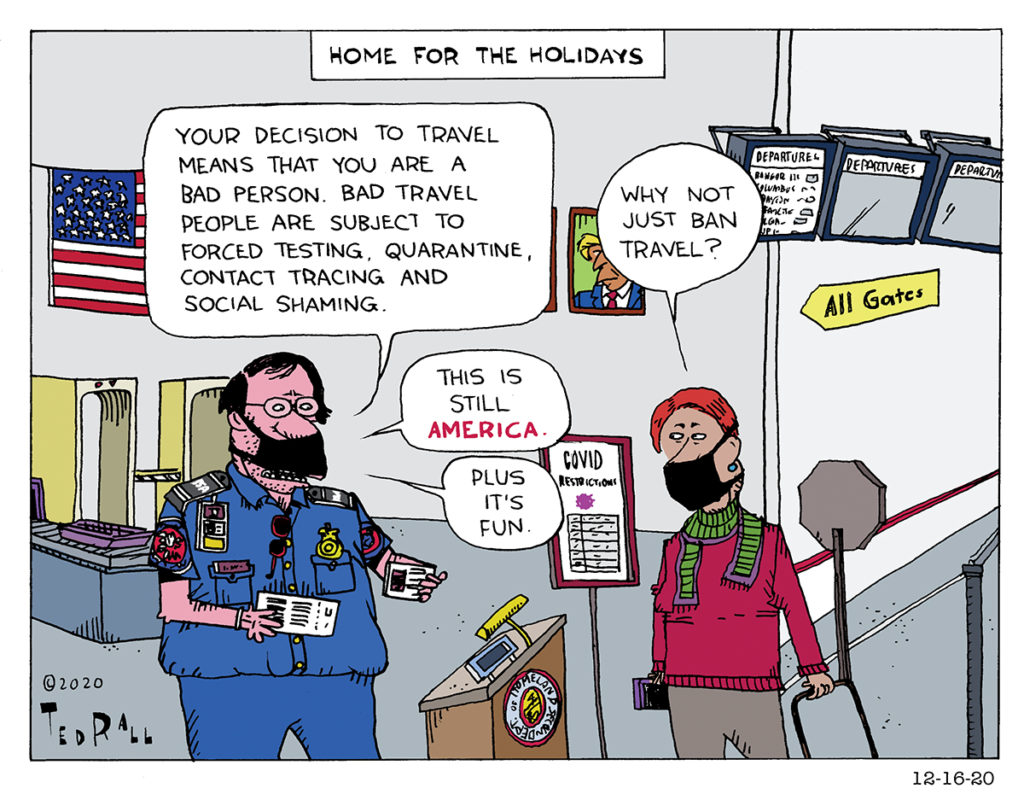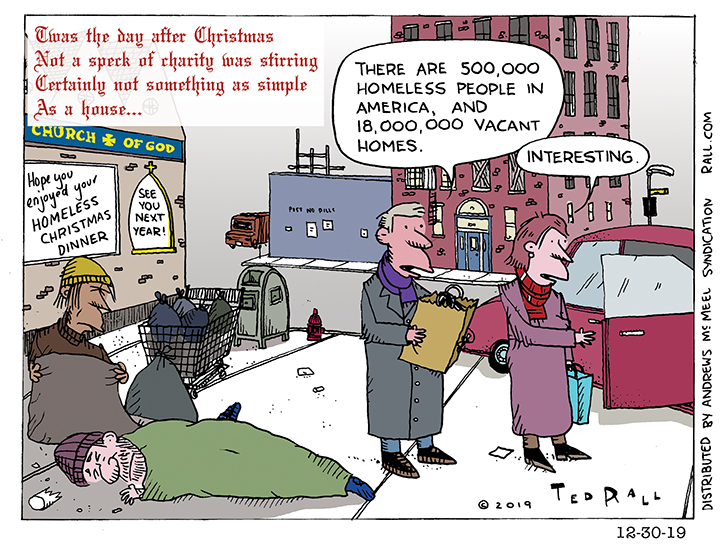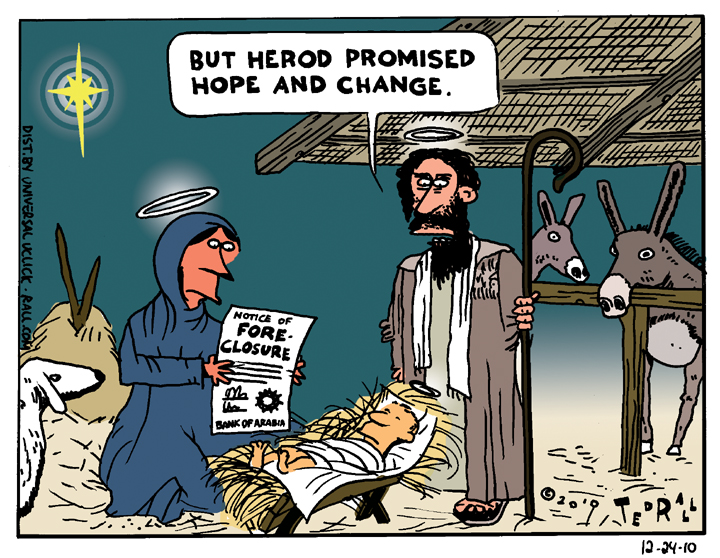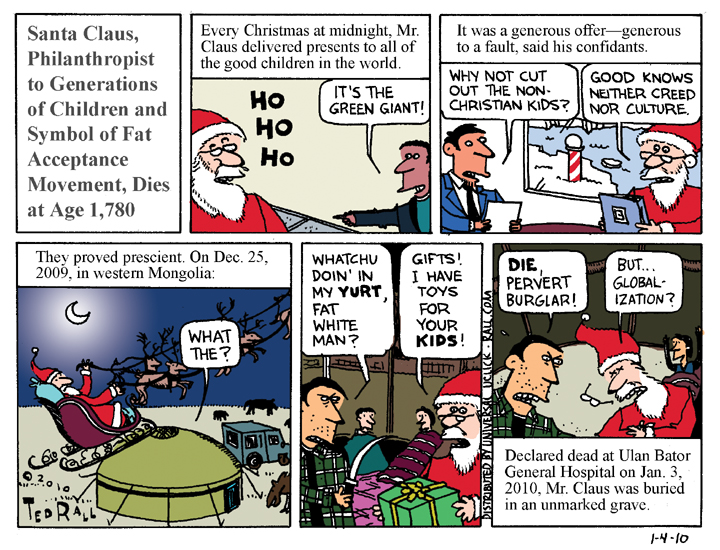It’s the most special time of the year: Festivus, when Americans gather by an unadorned pole to vent their grievances. Grievance number one: we’re three days late to this Festivus Special! Ted and Manila, two people paid to kvetch and complain, share their personal and political whines, grouses and rants to a world that’s too busy whining about their own silly worries to pay attention to our all-too-important complaints. Ted and Manila are pissed, and you’re gonna hear about it!
DMZ America Podcast Ep 186: Happy Festivus! Ted and Scott Air Their Grievances
The DMZ America Podcast’s Ted Rall (on the Left) and Scott Stantis (on the Right) celebrate the December 23rd holiday of Festivus with the traditional Airing of Grievances. As “Seinfeld”’s Frank Costanza said it in the show’s Festivus episode: “I got a lotta problems with you people, and now you’re going to hear about it!”
Scott and Ted are deeply, deeply disappointed by many people and things, and now you’re going to hear about it.
We Are Choosing to Make Hundreds of Thousands of Americans Live Outside
One of the more bizarre and pathetic aspects of capitalism is the self-congratulatory coverage of free meals given to the homeless and poor on holidays like Christmas, presented as though people don’t need to eat, or live inside, 365 days out of the year. Meanwhile, millions of homes are abandoned, wasted vacation homes or warehoused as investments.
Breaking Modern Essay: Don’t Lie to Your Kids About Santa Claus
Originally published at Breaking Modern:
Like most children, I grew up in a house without a chimney or fireplace. This made the Santa myth, which relies on a child’s unawareness of the size of the earth and its population, immediately less credible. How did the jolly fat guy gain access to our home, I questioned my mother?
No answer. I could see the wheels turning.
“He couldn’t possibly fit down the flue? Could he?” I tried to help.
I opened the utility closet. The pipe from the central heater and air conditioning convection unit to the ceiling was about six inches in diameter. Santa ferret?
Mom gave up. (If this convo happened today, she could have ordered a prevarification aid like Santa’s Magical House Key.)
Anyway, mom sat me down and confessed the truth: there’s no Santa, just a 10th-century Nordic myth. There was a reason, after all, that gifts labeled “from Santa” shared the same distinct handwriting as my mom’s.
When I tell this story to friends who are parents, they react with horror. “How awful! She deprived you of your imagination! Didn’t she want you to enjoy your childhood?” That point of view is represented by a 2010 essay in the San Francisco Chronicle: “All these childhood myths serve a brilliant purpose: a gentle way for kids to learn well-intended parents are not always reliable sources of truth.”
Awesome.
A 2012 Slate piece argues that not every lie is created equal: “First: Let go of any guilt you have about duping your kids. Santa belongs in the ‘good lie’ pile because parents invoke him for their kids’ sake; bad lies are the ones parents use to deflect blame or avoid responsibility—we can’t go to the playground today because it’s closed, when really, you’re just too lazy to get off the couch.”
I come down on the exact opposite side: A lie is a lie is a lie.
My mother’s decision to tell the truth about the Christmas myth is something for which I will be grateful my entire life. It certainly doesn’t seem to have negatively impacted my imagination: I’m a successful cartoonist and an excellent storyteller. But it did establish at an early age that I could count on my mother to tell me the unvarnished, honest truth. I knew, for many years following that incident, that I could count upon her for a no bullshit view of the world. It strengthened my trust in her, and therefore in my love for her. It was definitely a win-win.
While other parents kept lying to their elementary school-aged and even older children, especially about sex, my mother replied to my question about the birds and the bees by taking down her college biology book and showing what went in where and what happened after that.
Don’t get me wrong. My mother and I didn’t have a perfect relationship. Breaches of faith opened up between us. Mostly, however, this occurred not when my mom tried to protect me from some kind of unpleasant truth, but when she tried to bullshit me.
Never lie to someone unless you are sure you will get away with it.
For whatever reason, my mom tried to blow smoke up my tuckus more when I was a teenager and therefore even less likely to fall for bullshit – especially since she had already made the “mistake” of teaching me critical thinking and reading between the lines. Suddenly God, previously an abstraction, was marketed to me as a real, living entity who knew everything that I was up to and would punish me if I did wrong.
Definitely a mistake to try this bigger version of the Santa myth on me. I remember thinking to myself, “wow, she really thinks I’m stupid. I don’t know why I would confide in her. And when I experienced teen crises – sex, drugs, depression, academic problems – I became less likely to confide or share.
You don’t need to be a psychologist specializing in early childhood to know that trust creates the strongest bond between humans. Whether it’s a friend or a parent, think about it: as an adult, you believe in people whom you can count upon to give it to you straight.
Children aren’t stupider than adults. They’re certainly more observant. Don’t insult their intelligence.
And don’t worry about stifling their imagination.
“The Santa Lie…does not actually promote imagination or imaginative play,” William Irwin and David Kyle Johnson write in Psychology Today. “Imagination involves pretending, and to pretend that something exists, one has to believe that thing doesn’t exist. Does the Christian “imagine” that Jesus rose from the dead? Does the Muslim “imagine” that Muhammed’s rode his horse Barack (Al Boraq) at lightening speed from Mecca to Jerusalem and then assended into heaven? Of course not; they believe these things are true. Tricking a child into literally believing that Santa exists doesn’t encourage imagination, it actually stifles it. If you really want to encourage imagination in your children, tell them that Santa doesn’t exist, but that you are going to pretend like he does anyway on Christmas morning.”
This Christmas season, don’t give in to the temptation of signing off on a ridiculously transparent lie that will begin to undermine your relationship with your child. Tell her the truth. She can take it. She’ll love you more for it.
SYNDICATED COLUMN: The War of Christmas
Time to Take Religion Out of the Calendar
We are a secular nation. We enjoy the constitutional right to exercise any religion—or none whatsoever. So why is Christmas a federal holiday?
The U.S. has no national religion. Yet Christians get special consideration. Aside from Christmas, they also get the quasi-Christian holiday of Thanksgiving. Financial markets are closed on both of those, plus Good Friday.
Devotees of other faiths must ask their employers for time off. Jews aren’t supposed to work on Rosh Hashanah, Yom Kippur, the first and second days of Sukkot, Shemini Atzeret, Simchat Torah, Shavu’ot, or the first, second, seventh and eighth days of Passover. They have to take up to 13 days off from work each year, more than most employers offer.
The message to Jews and other non-Christians is plain: you are second-class citizens. Separation of church and state is a fraud. You wanna practice your faith? Do it on your own time.
You might think that the government’s official embrace of Christmas is a cultural relic of America’s puritan past. But you’d be mistaken. For nearly 100 years, Christmas was not on the calendar of federal holidays. On December 25, 1789, the first Christmas under the new U.S. constitution, Congress was in session. Ulysses Grant made it a federal holiday in 1870.
At first (and second and third) glance, the Christmas federal holiday seems like a clear violation of the Establishment Clause of the U.S. Constitution. In 1999, however, a federal district court judge in Ohio rejected a lawsuit challenging the special status of Christmas. The court ruled that “the establishment of Christmas Day as a legal public holiday does…not have the effect of endorsing religion in general or Christianity in particular.”
Legal reasoning gave way to the simplest calculus: we do stuff because we can.
Right-wing commentators such as Bill O’Reilly have accused liberals of waging a “war on Christmas.” Actually, there’s a war of Christmas: Christians use the holiday as a bludgeon against the rest of us. (Sort of how the “war on terrorism” is really a “war of terror.”) Christmas’ designation as a federal holiday is the most brazen and thus most offensive manifestation of Christian hegemony in America.
The Christian Right’s “war on Christmas” meme would be laughable if it didn’t work; they’re the majority, they’re in charge, but somehow they’re victims. The smallest concession to common decency and sensitivity—e.g. not displaying nativity scenes on government property—is portrayed as an attack on innocent Christians. Not subtle. But clever: the dominant majority gets to claim victimhood. Anything short than total domination isn’t good enough.
This has nothing to do with suppressing Christianity. I am touched, not offended, when a person of faith says that he or she is praying for me, or wishes me a “Merry Christmas.” Individual and/or private displays of religiosity are fine.
Official expressions of a specific religion, however, are disgusting and inherently repressive. Public-school teachers should not wish their students a Merry Christmas. Presidents should not end speeches by saying “God Bless America.” Our currency should not read “In God We Trust.” Courts should not use Bibles to swear in witnesses. Government officials and employees who wear their Christianity on their sleeves reinforce the majority and subjugate the minority. Notice, it’s always Christians. When’s the last time a TSA screener wished you a blessed Ramadan?
A country should live up to its stated principles. Everyone who wants to honor Christmas, whether in its religious or its consumerist contexts, is free to do so. Go to midnight mass. Festoon your roof with plastic Santas. But the government shouldn’t make it easier on Christians to celebrate one of their religious holidays than it does members of other faiths.
There are only two fair courses of action:
First, remove Christmas from the list of federal holidays. But replace it with something secular! Preferably in March or April. There’s a long gap there.
Alternatively, add holidays for other religions. Of course, this could get complicated. How many holidays for each religion? Some faiths are more festive than others. How far down the list of major American religions do we go? The Zoroastrian holiday of Navruz? Shall we make room for new religions like Scientology?
After every sect gets its day in court there might not be a single day left in the year to work.
I say: the more days off, the merrier. Er, better.
(Ted Rall is the author of “The Anti-American Manifesto.” His website is tedrall.com.)
COPYRIGHT 2010 TED RALL

